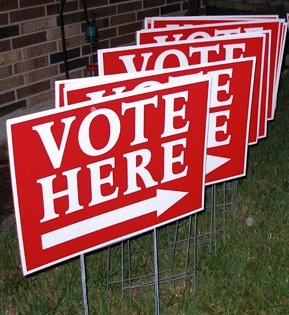Advocates draw voting wars to a stalemate in key Southern states

The war over who gets to vote, and how -- an ever-brewing battle, escalated in recent years -- continues to rage across the South.
But after a year of looking like a win for those pushing photo ID requirements and other voting restrictions, voting rights advocates have mounted a comeback that has drawn the voting wars to a stalemate in many key Southern states.
Which isn't to say conservative lawmakers haven't scored key victories in the voting wars. After 2010, when Republicans took over or increased their numbers in many state legislatures, they succeeded in pushing a passel of voting law changes, recently summarized by the Brennan Center for Justice:
VOTER ID: 34 states saw laws that would deny the vote to those without a photo ID. Photo ID bills were signed into law in nine states, including Alabama, South Carolina, Tennessee and Texas. Virginia, which considered a photo ID law, instead approved a bill allowing multiple kinds of ID.
PROOF OF CITIZENSHIP: In an intermingling of the immigration and voting debates, 17 states saw bills requiring proof of citizenship, like a birth certificate, to vote. Alabama, Kansas and Tennessee passed the laws; Tennessee's version only requires a check for those flagged as potential non-citizens, a process that's been riddled with errors in Florida.
RESTRICTING VOTER REGISTRATION: 16 states introduced bills limiting who could register people to vote, and how voters registered. Florida, Illinois and Texas passed laws restricting voter registration drives, and Florida and Wisconsin passed laws making it more difficult for people who move to stay registered and vote.
REDUCING VOTING DAYS: Nine states saw legislation to shorten their early voting days; they passed in Florida, Georgia, Ohio, Tennessee and West Virginia.
BARRIERS TO RESTORE VOTING RIGHTS: Two states -- Florida and Iowa -- reversed prior executive actions that made it easier for citizens with past felony convictions to restore their voting rights.
And that's just the state legislatures. In Florida, Gov. Rick Scott authorized a controversial purge of suspected "non-citizens" on the voter rolls.
But in recent months, what appeared to be a Republican voting war knockout has turned into a draw. In many key states, a combination of grassroots advocacy and legal intervention has frustrated GOP efforts to enact far-reaching election changes, at least in time to impact the 2012 elections.
A state-by-state survey of the voting rights pushback:
FLORIDA: The Department of Justice intervened to stop Florida's far-reaching voting restrictions; the case is still being considered in court. On the issue of voter registration rules, on May 31 a U.S. judge in Atlanta struck down the new Florida rules, calling them "harsh and impractical."
The Justice Department also moved to block Florida's voting purge. Last week, a judge overturned DOJ's injunction, in what many viewed to be a victory for Gov. Scott. But most Florida election officials are declining to carry the purge out -- as Vicki Davis, president of the Florida State Association of Supervisors of Elections, told The Nation: "The supervisors are where we were before—we’ve stopped the purge."
NORTH CAROLINA: In another key battleground state, it didn't even get to the litigation stage. In 2011, the state's new Republican majority passed a photo ID requirement. But a spirited push-back campaign by groups including Democracy North Carolina, the League of Women Voters and the NAACP helped convince Democratic Gov. Beverly Perdue to veto the bill. When the legislature came back in 2012, it managed to override many of Perdue's vetos -- but realized it didn't have the votes on photo ID, and adjourned without a vote on the bill.
Republicans did score one victory in North Carolina's election wars, however: At the last minute, they pulled from the budget $600,000 for the state election board -- a move that will cost the state $4 million in federal matching funds to improve election systems heading into 2012.
SOUTH CAROLINA: The Department of Justice blocked S.C.'s new photo ID bill in December 2011, arguing the state couldn't show it wouldn't have a disparate impact on African-American and Latino voters. In a blow to the state, a federal court recently said it won't hear the case until September 24 -- making its implementation by November 2012 unlikely.
TEXAS: DOJ had also blocked Texas' new photo ID bill because "it would have had a disproportionate impact on Hispanic voters," according to Attorney General Eric Holder. The case will be heard July 9, making it possible the law could take effect by November.
Texas has gone further in fighting for its photo ID requirement, challenging the very ability of the Justice Department to intervene under the Voting Rights Act. Section 5 of the Act requires certain states, based largly in the South, to "pre-clear" or seek approval from the federal government before enacting major changes to elections.
Many Texas Republicans not only disagree with Section 5 -- they want to do away with the Voting Rights Act entirely. In late June, the state Republican Party released its official platform, which included this plank:
Repeal the Voting Rights Act of 1965: We urge that the Voter Rights Act of 1965 codified and updated in 1973 be repealed and not reauthorized.
Clearly, the voting wars won't be ending anytime soon.
Tags
Chris Kromm
Chris Kromm is executive director of the Institute for Southern Studies and publisher of the Institute's online magazine, Facing South.
